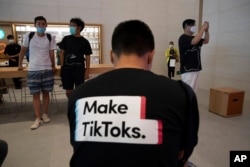Disinformation Campaigns Skewing Young People’s View of War in Ukraine
washington —
As the world focuses on Russia’s war on Ukraine, another conflict is raging — on people’s phones.
In the information war, TikTok has become a battlefield. Popular among younger audiences, the platform known for dance videos has, for some, become an information source on the war in Ukraine.
With new, unverified content appearing on TikTok by the second, some analysts worry that the platform often serves to mislead its users, numbering 1 billion worldwide.
“Those [videos] can be used to enlighten folks on what’s really happening on the ground,” said Jessica Brandt, policy director for the Brooking Institution’s initiative on artificial intelligence and emerging technology. “They can also be taken out of context and used to mislead or to disinform. We see all of that happening in this conflict.”
TikTok is not the only social media app that has the power to misinform young people about the war in Ukraine. Ryan Locher, an American University student and TikTok content creator with more than 18,000 followers, told VOA that he has seen a number of false narratives on the Russia-Ukraine conflict gaining momentum on other popular social media apps.
“I see it on Twitter, obviously on TikTok,” he told VOA. “It is very easy to pick up where these people are coming from.”
Student perceptions
Locher said he’s noticed pro-Russian TikTok users spreading conspiracy theories to justify the Russian invasion of Ukraine, from alleged Ukrainian bioweapons labs to Nazi threats allegedly emanating from Kyiv.
While some false information aims to mislead, Locher said other content “stems from people’s prior convictions as they attempt to build their understanding of the conflict.”
Andriana Markiv, a U.S. citizen born in Ukraine who studies at American University in Washington, agreed. “Not all of it [misinformation] comes from a place of hatred; sometimes the people spreading fake news genuinely don’t know,” she said.
However, according to Markiv, some users purposefully post false information to generate controversy – and traffic – on social media platforms. “They do it to get likes and comments,” she added.
Regardless of the intent, the profusion of misinformation about the war is upsetting to many Ukrainians.
“I call my family and I hear them crying and then I go on social media and see people saying that this war is Ukraine’s fault or spreading pro-Russian propaganda. I try to go past that because it is hard,” Markiv said.
Albina Tokakova, a Russian student living in the United States, believes Russians and Ukrainians alike are using social media to spread information that best fits their nation’s interests. She said some seek to justify the Russian invasion while others defend Ukraine’s sovereignty and independence.
“I feel like it’s really difficult right now to tell what is right and what is wrong and which ones are the correct information,” Tokakova told VOA.
Tokakova added that, while there is much disinformation being spread on TikTok, the platform has also served to publicize Ukrainians’ struggles to survive the Russian invasion.
Chinese ownership
With TikTok owned by Chinese company ByteDance Ltd, some worry it serves as a tool for Beijing to influence the views and perceptions of people around the world.
Matthew Lee, a student at American University’s School of International Service, doesn’t use TikTok.
“We see in Chinese social media like a lot of nationalist stuff being said, a lot of pro-Russia stuff being said, and because of how tightly they control everything, it’s hard to say whether it really is real people or folks that the Chinese government pays to say things,” Lee told VOA.
Some analysts believe that this is part of a larger strategy by the Chinese government to manipulate information to fit its narrative, be it the war in Ukraine or any number of geopolitical topics.
“I think China has used information manipulation to shape views on issues that are of geopolitical relevance to it. For some time now, those efforts are becoming more assertive and I think they’ll only continue to grow,” Brandt of the Brookings Institution said.
Students at American University told VOA they do what they can to combat misinformation. As a native Russian, Tokakova seeks to correct false narratives about her home country.
Loher told VOA he uses the reporting tool on TikTok to flag videos containing false information. “I have also messaged some of the creators [of fake content],” he added.
As for Markiv, she advises users of social media to be wary of the content they consume, adding that while the war in Ukraine may appear distant to Americans, “you [could] have students in your class or friends who are going through this with their [Ukrainian] families.”
Editor’s note: This article has been updated to reflect that Andriana Markiv is a U.S. citizen.



